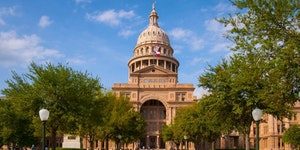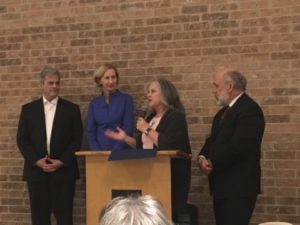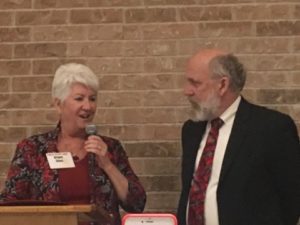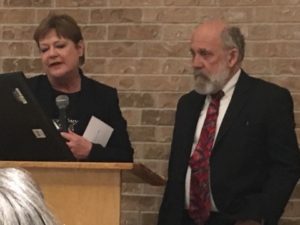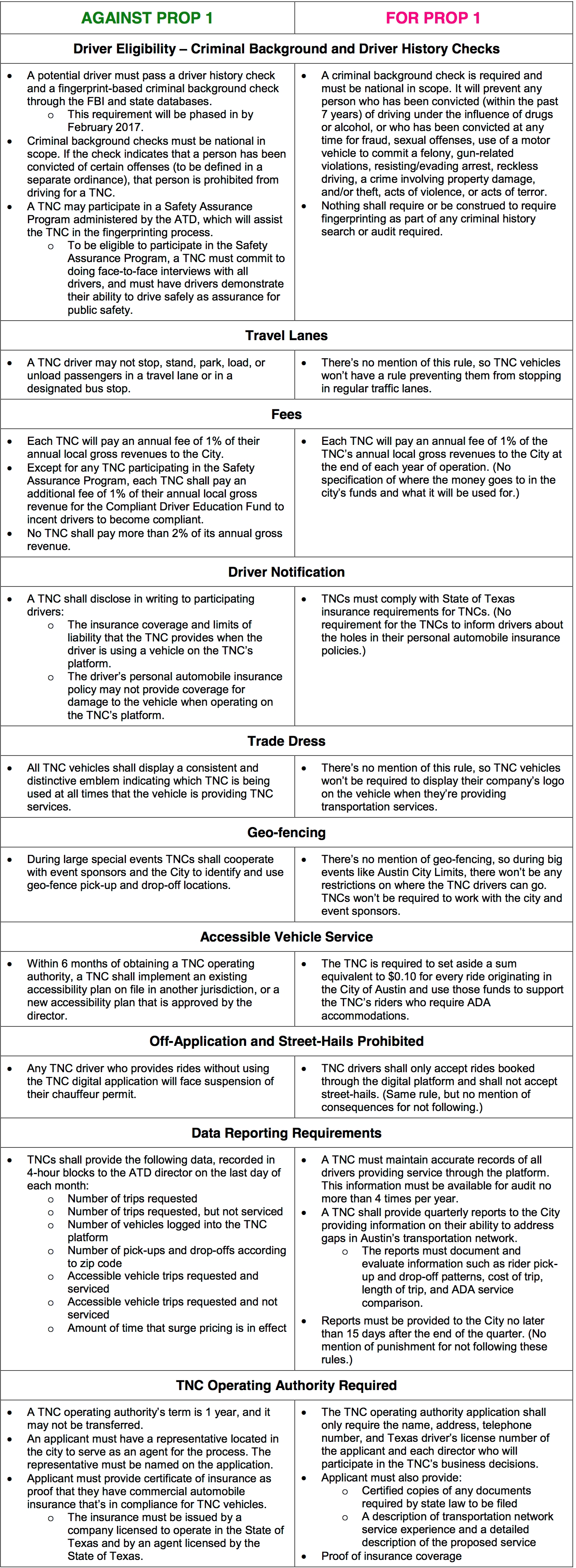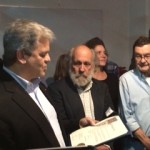Archive for the ‘Ethics’ Category
Public comments for State Bar proposed rules changes due November 1st
Posted in Consumers, Ethics, tagged Texas on October 16, 2018 |
Open Government, Engaged Citizens: A Conversation on Texas’ Public Information Act
Posted in Ethics, Good Government, Right to know, tagged Texas on March 27, 2018 |
The Texas Public Policy Foundation, the Freedom of Information Foundation of Texas, the Texas Press Association, the Texas Association of Broadcasters and Public Citizen presents
Open Government, Engaged Citizens:
A Conversation on Texas’ Public Information Act
Texas once led the nation in government transparency, but a series of recent developments have stymied the public’s ability to access information and provide opportunities for public comment about how your tax money is being spent and about who is acting on your behalf. This new dynamic has spurred many to call for change. Join the Texas Tribune’s Ross Ramsey and our panel of policy experts to discuss what changes, if any, can be made to strengthen the Public Information Act and how Texas can let more sunshine in. This is a free event, so register early to get a ticket – Open Government, Engaged Citizens: A Conversation on Texas’ Public Information Act
It is not often that Public Citizen’s name appears in concert with the Texas Public Policy Foundation, but this is an important issue and we encourage our supporters to attend. Be sure to register by clicking on attend below.
Thursday, March 29, 2018 from 11:30 AM to 1:00 PM (CDT)
Texas Public Policy Foundation
View Map
901 Congress Avenue
Austin, TX 78701
Complimentary lunch will be served.
For a map of downtown Austin public parking, please click here.
Texas Should Urge Congress to Ratify an Amendment to the U.S. Constitution Overturning Citizens United
Posted in Campaign Finance, Ethics, tagged Texas on March 29, 2017 |
Representative Rafael Anchia has a resolution to overturn Citizens United, HCR 34 that will be heard on Thursday, March 30th in the State & Federal Power & Responsibility, Select Committee (which convenes at 8:00 AM in committee hearing room E2.036 at the Texas Capitol in Austin, TX).
On January 21, 2010, the U.S. Supreme Court ruled in Citizens United v. Federal Election Commission (FEC) that campaign contributions limits for “independent expenditures” of individuals, unions, and corporations were unconstitutional. In the decision, the majority argued that spending money in our political process is no different than voicing an opinion; it’s speech and it’s protected under the First Amendment.
Seven years later, the drastic consequences of this decision are still haunting our country. Eighteen states, Washington, D.C. and more than 700 municipalities have already called for a constitutional amendment to overturn this ruling that has proved so damaging to our democracy.
Currently, the political system rewards politicians who court a handful of major donors and punishes candidates who rely on small donations from a broad base of ordinary citizens. The result? Local, state and national public policies correlate less and less with public sentiment. Our nation was founded to be “of the people, by the people” and “for the people,” and Americans across the political spectrum agree that big donors have too much power over our government. A national poll found that 80 percent of Republicans and 83 percent of Democrats support overturning Citizens United. There are few other issues that unite us in this way.
We commend the state of Texas for its ban on direct corporate contributions to political candidates. However, it’s not enough. Citizens United allows for corporations and unions to sidestep this regulation by contributing to super PACs without limit and anonymously. In Texas, political spending by entities that do not disclose the identities of contributors reached over $900,000 in the 2014 election cycle. More than $10 million was spent by outside spenders on Texas federal races in 2016.
This ruling weakens states’ rights by opening the doors for deep-pocketed outside interests to disproportionately dominate local elections. This is not normal, nor is it okay.
The Court’s decision rolled back nearly a century of laws – federal and state – passed by lawmakers from both sides of the aisle who, regardless of political affiliation, agreed that reasonable restrictions can and should be placed on campaign spending by powerful special interests to protect our democracy. Citizens United itself struck down key parts of the Bipartisan Campaign Reform Act of 2002 (BCRA), known as the McCain-Feingold Act. BCRA was introduced by U.S. Sen. John McCain and was signed into law by President George W. Bush.
The founding fathers spoke to the importance of a person’s political influence being the same, regardless of economic bracket. To quote James Madison in the Federalist Papers:
“Who are to be the electors of the federal representatives? Not the rich, more than the poor; not the learned, more than the ignorant; not the haughty heirs of distinguished names, more than the humble sons of obscure and unpropitious fortune. The electors are to be the great body of the people of the United States.”
Our current system runs contrary to Madison’s vision. Our current system runs contrary to the will of the majority of Americans. Our current system caters to the needs of billionaires over the general population, to corporations over small businesses and to the political greed of a minority over the common sense of the majority. The Citizen United ruling is central to these wrongs, and Texas should join independent thinking states throughout the nation in calling for the return of our democracy to the people.
Contact the committee members and tell them you support HCR 34 and think they should vote it out of committee so the Texas Legislature can vote on this resolution.
Public Citizen Honors Tom “Smitty” Smith
Posted in Air Quality, Campaign Finance, Climate Change, Consumers, Diesel, Efficiency, Ethics, Global Warming, Good Government, Nuclear, Pollution, Radioactive Waste, renewable portfolio standard, Renewables, Right to know, solar, Sunset, Texas Legislature, Transportation, tagged Texas on February 2, 2017 |
After more than three decades of extraordinary work running Public Citizen’s Texas office, “Smitty,” formally known as Thomas Smith, is hanging up his spurs. Smitty is a Texas institution and a national treasure, and on February 1st, we celebrated him right.
Over 200 people attended a retirement dinner for Smitty at the Barr Mansion in Austin, TX on Wednesday evening. Friends and colleagues from around the state who had work with Smitty on issues over his career that included clean energy, ethics reform, pollution mitigation, nuclear waste disposal, etc came to pay homage to a man who had dedicated his life to fighting for a healthier and more equitable world by making government work for the people and by defending democracy from corporate greed.
During the evening, Austin Mayor – Steve Adler, Travis County Commissioner – Brigid Shea, and Dallas County Commissioner – Dr. Theresa Daniel presented Smitty with resolutions passed by the City of Austin, Travis County Commissioners Court and Dallas County Commissioners Court all of which acknowledge Smitty’s contributions to their communities and the state of Texas.

Adrian Shelley (front left) and Rob Weissman (front right) at Tom “Smitty” Smith’s retirement event.
Public Citizen’s President, Robert Weissman, thanked Smitty for his service to Public Citizen for the past 31 years and introduced the new director for the Texas office, Adrian Shelley, the current Executive Director of Air Alliance Houston.
Smitty’ impending departure fromPublic Citizen will leave a big hole in advocacy for progressive issues here in Texas, but both Smitty and Robert Weissman expressed confidence that Adrian would lead the Texas office forward into a new era of progressive advocacy. Adrian is a native Texan from the City of Houston. He has served as the Executive Director of Air Alliance Houston since 2013. He first worked with Air Alliance Houston as a legal fellow in 2010, then as a Community Outreach Coordinator in 2012. In that time, Public Citizen has worked closely with Air Alliance Houston through the Healthy Port Communities Coalition (HPCC), a coalition of nonprofits and community groups which advocates policies to improve public health and safety while encouraging economic growth.
So be assured that Adrian and the Texas staff of Public Citizen are committed to carrying on the battle for justice, for democracy, for air clean and energy and for clean politics. We can and will protect our children and the generations to come. For this, we can still use your help. You can make a tax deductible donation to the Texas office of Public Citizen to help us continue his vital work on climate, transportation, civil justice, consumer protection, ethics, campaign finance reform and more
Austin Uber and Lyft Vote – Breakdown of Proposition 1
Posted in Consumers, Ethics, Good Government, Local Control, Safety, Transportation, tagged Texas on April 18, 2016 |
The Uber/Lyft debate has been raging in Austin for months, but do you know what you’ll actually be voting on? Voting is a right, but being an informed voter is a responsibility.
Proposition 1 is a vote on rules and regulations in Austin for transportation network companies like Uber and Lyft. If you vote AGAINST Prop. 1, you’re voting for the City of Austin’s proposed safety rules. If you vote FOR Prop. 1, you’re voting for Uber and Lyft’s proposed regulations that they personally drafted in retaliation to the Austin City Council’s ordinance. While a lot of the rules in the two ordinances are the same, there are some very important differences as well. To make it easier for voters to understand, we’ve highlighted the differences in the ordinances, and therefore what Austin residents are really voting on at the polls on May 7.
Key:
- AGAINST PROP 1 – City of Austin’s regulations
- FOR PROP 1 – Uber and Lyft’s regulations
- TNC (Transportation Network Company) – an organization, whether a corporation, partnership, sole proprietor, or other form, which provides on-demand transportation services for compensation using an online-enabled application or platform to connect passengers with drivers.
- ATD (Austin Transportation Department) – section of the Austin government that addresses transportation needs and challenges, as well as public safety.
The regulations the City Council passed in December requiring stricter rules than currently in place for Uber and Lyft are not absurd. People who operate pedicabs or horse carriages in the city already have to get fingerprinted. Make no mistake; this is not an issue of keeping Uber and Lyft in Austin. That’s not what the vote is for on May 7. The City Council isn’t kicking anyone out; they’re just leveling the playing field for all TNCs by making sure they follow the same rules. And if these particular companies choose not to do business here, Austin Uber and Lyft drivers will soon be provided with new transportation companies to drive for.
Uber and Lyft have already pumped $2.2 million into this campaign, which is evident in their abundant advertising. This is supposed to be a local issue, but it’s quickly becoming a perfect example of why Citizens United should be repealed. Vote “No” for Prop. 1 and show corporations that they can’t write their own rules and buy local politics in Austin.
Are You Represented by a Climate Change Denier?
Posted in Climate Change, Energy, Ethics, Global Warming, Good Government, Texas Legislature, tagged Texas on March 26, 2016 |
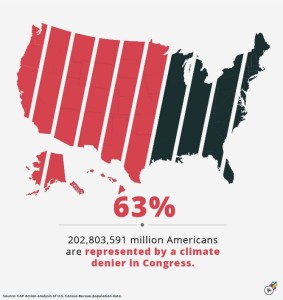
2014 and 2015 were back-to-back years that both earned the title for hottest year on record. and February 2016 was the warmest month, globally, ever recorded. And yet U.S. lawmakers continue to deny the facts. Earlier this month, the Center for American Progress Action Fund (CAPAF) released an analysis of climate change denial in U.S. Congress called “The 2016 Anti-Science Climate Denier Caucus.” Their research found that more than 63% of Americans are represented by someone in Congress who denies that climate change exists.
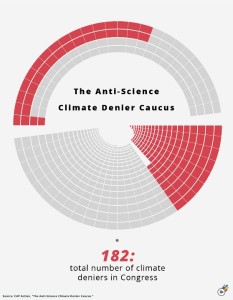 182 members of Congress don’t believe the science behind climate change: 144 members in the House of Representatives and 38 members in the Senate. 67% of Americans want the U.S. to take action on climate change, but 202 million citizens are represented in Congress by a climate change denier. Since the Republican Party’s platform on environmental policy never mentions climate change, it’s no surprise that every single denier is a member of the Republican Party.
182 members of Congress don’t believe the science behind climate change: 144 members in the House of Representatives and 38 members in the Senate. 67% of Americans want the U.S. to take action on climate change, but 202 million citizens are represented in Congress by a climate change denier. Since the Republican Party’s platform on environmental policy never mentions climate change, it’s no surprise that every single denier is a member of the Republican Party.
A recent poll revealed that 76% of Americans believe global climate change is occurring, including 59% of Republicans. According to a poll by NBC News and the Wall Street Journal, 67% of Americans support President Obama’s Clean Power Plan. The results of these polls don’t correlate with the fact that that the number of Congressional climate deniers has increased from previous years. From severe weather, wildfires, drought, and flooding, climate change is impacting Americans every day, and it’s evident that human activity is the dominant cause. Despite this evidence, 70% of the Senate GOP still denies climate change.
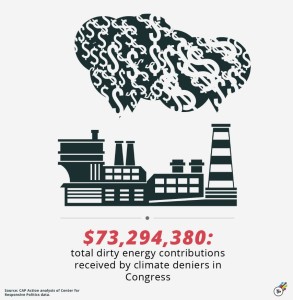 In the analysis, CAPAF also looked into dirty energy money’s influence over Congress members. They found that climate deniers in Congress received more than $73 million in contributions from coal, oil, and gas companies. This is an increase of nearly $10 million from last year. When asked about their views on climate change, many deniers dodge the question by saying “they aren’t scientists”.
In the analysis, CAPAF also looked into dirty energy money’s influence over Congress members. They found that climate deniers in Congress received more than $73 million in contributions from coal, oil, and gas companies. This is an increase of nearly $10 million from last year. When asked about their views on climate change, many deniers dodge the question by saying “they aren’t scientists”.
According to Sondre Båtstrand, a Norwegian researcher, the U.S. Republican Party is the only conservative party in the world which denies the reality of climate change. Båtstrand believes the GOP’s denial is due to three factors: the fossil fuel industry’s political spending, a commitment to free-market ideology, and the intense political polarization that punishes moderate-minded party members.
In February 2016, over 200 lawmakers in U.S. Congress signed onto a court brief opposing the president’s Clean Power Plan. At the end of 2015, the House of Representatives passed two resolutions to kill the Clean Power Plan. The Plan would regulate power plants’ carbon emissions and 67% of Americans support it. So it’s clear that Congress isn’t working the way it’s intended to. Members of the House and Senate are elected to represent the interests of American citizens, not their own fat wallets and the interests of dirty energy companies.
Regarding the state of Texas specifically, the 2016 Anti-Science Climate Denier Caucus found that 17 out of 38 Texas Congressional members are climate change deniers. In 2016, this is not only unacceptable, but is dangerous for Texas families who depend on their elected leaders to protect their futures. When the impacts of climate change become more and more apparent each year – more severe storms, deadly wildfires, crippling drought, and rising sea level – it’s clear there’s no time to waste. Climate change deniers in Congress, like Ted Cruz, stand in the way of these common sense safeguards. Texans and Americans across the country deserve leaders who will stand up to face this threat head on – not those following the playbook of their largest campaign donors.
Texas Ethics Commission Rejects adoption of a dangerous “advisory opinion”
Posted in Ethics, Good Government, tagged Paxton, Texas, Texas Ethics Commission on January 28, 2016 |
UPDATE:
Ethics Commission rejects opinion to allow out-of-state donors to pay Paxton’s legal bills
Vote was 4 to 3 with one absent
At the beginning of the last legislative session, Governor Abbott announced he was making ethics reform an emergency priority for the Texas legislature to address. In the end, very little ethics reform was passed, and now the Texas Ethics Commission is poised to adopt a dangerous “advisory opinion” Monday that hangs a “For Sale” sign on the Texas Attorney General’s office.
The draft opinion (AOR-605) invites out-of-state donors to give indicted Attorney General Ken Paxton unlimited amounts of money to pay his ballooning criminal defense bills (see Houston Chronicle story below). This opinion is a powerful magnet for political corruption, one drafted for the exclusive benefit of Ken Paxton, who is under indictment for alleged criminal securities fraud.
Send an email message today urging the Ethics Commission to:
- Reject the Paxton Loophole; and
- Pursue an absolute ban on all gifts for the AG’s criminal defense.
Email your brief comments to: Commissioners, Texas Ethics Commission at: public_comment@ethics.state.tx.us,
Below is an article by the Houston Chronicle on the proposed ethics opinion
Proposed ethics opinion would let AG tap out-out-of-state donors for defense funds
By David Saleh Rauf and Lauren McGaughy
January 26, 2016 Houston Chronicle
AUSTIN – Indicted Attorney General Ken Paxton could tap out-of-state supporters to pay his legal defense team but must ensure those funds have not been funneled from any Texas donors, according to a draft advisory opinion from the state’s ethics regulator.
The Texas Ethics Commission is scheduled to vote Monday on legal guidance that would give Paxton, or any employee in the attorney general’s office, the green light to accept gifts from some donors.
If approved, it would clear the way for the embattled attorney general to accept contributions to cover his legal expenses from out-of-state donors, with certain conditions.
State law prohibits agency officials from accepting a “benefit” from someone under the agency’s oversight.
However, the ethics commission has said situations exist in which Paxton and his employees could accept gifts – namely from an out-of-state donor with no pending matters before the attorney general’s office – but that safeguards would have to put in place to prevent potential conflicts of interest.
The draft opinion for the first time addresses the possibility of money bundling and suggests heightened disclosure for gifts to employees of the attorney general’s office to avoid the perception of corruption.
It comes as Paxton and his team of high-profile defense attorneys appeal a recent court ruling while preparing for a possible trial in his pending felony fraud case.
‘Diligent inquiry’
Paxton is accused of breaking state securities laws by encouraging investors to buy stock in a North Texas tech company without disclosing that he was being paid by the firm, and for funneling clients to a friend’s investment firm without being properly registered as an investment advisor representative with the state.
He faces two first-degree felony charges, which carry a sentence of five to 99 years in prison and a fine, and one third-degree charge.
Paxton repeatedly has declined to detail how he is paying for his attorneys, saying only that neither his $2.5 million in campaign funds nor taxpayer money is being used.
A draft opinion released in late November provided the initial blueprint for Paxton to avoid violating the state’s gift-giving laws while accepting a “benefit” from a donor in certain circumstances.
The opinion was crafted in response to an anonymous request that specifically addressed situations in which potential donors are from outside Texas, minimizing the possibility they could be subject to the attorney general’s vast umbrella of jurisdiction.
The commission sent the proposal back for more internal vetting after questions were raised about the possibility that an out-of-state supporter could bundle or mask the fact that funds were coming from Texas donors.
The commission now is set to take up the refreshed guidance, which makes clear that Paxton or anyone in his office accepting a gift first will have to root out the “true source of the benefit” to ensure he is abiding by the law.
“We do not think that a person who is subject to the jurisdiction of a public servant or a law enforcement agency can evade the restrictions … using another person as a conduit for making a gift to the public servant (e.g., by giving a benefit to another with the instructions that the benefit then be passed to the public servant),” commission staff wrote in a draft opinion released this week. “Similarly, the public servant would be prohibited from accepting a benefit if the public servant knows that the true source of the benefit is a person who is subject to the jurisdiction of the public servant.”
The draft also proposes a set of “best practices” for disclosure, including recommendations that any such gift, along with its source, value and a description, be revealed publicly within 30 days.
A “diligent inquiry” also would have to be performed by whomever receives a gift to make sure the donor has no connection to Texas and is not under the attorney general’s jurisdiction. That inquiry, according to the latest draft, also would need to verify that the out-of-state donor “is not operating as a conduit” for someone else.
Not for sale
Watchdog groups reacted with swift criticism, saying the latest proposal invites the potential for an already-indicted attorney general to put a “for-sale sign on the AG’s office to pay for his criminal defense.”
“A close reading suggests that the commission has qualms about this convoluted ethical blank check,” said Craig McDonald, director of the left-leaning watchdog group Texans for Public Justice, which has filed multiple criminal complaints against Paxton, including one related to his current indictments. “The opinion should have been written in one word: No!”
The ethics commission does not identify who asks for an advisory opinion, but the circumstances laid out in the request mirror those of the attorney general.
At a recent hearing, the commission debated the issue with pointed comments specifically aimed at how the opinion could help establish the equivalent of a legal fund for Paxton.
Paxton also recused himself, without explanation, from all matters pertaining to the ethics commission just as the opinion request was being considered publicly.
The question of who is footing Paxton’s legal bill has become one of the mysteries in his ongoing criminal saga. His defense is expected to cost millions of dollars.
Paxton, a Republican, took office in January 2015 and was indicted six months later for allegedly violating state securities laws during his time as a state lawmaker. He was fined and reprimanded in April 2014 for not registering with the state as an investment adviser representative but has pleaded not guilty to all charges and asked for a jury trial in his home county.
No gift ban
Meanwhile, ethics regulators have been wrestling with the issue of gifts for employees in the attorney general’s office since July, when the request for an opinion first was lodged.
A blanket prohibition on gift-giving exists for the governor, lieutenant governor and members of the Legislature, along with their staffs, though there are several exceptions that allow freebies to flow to those elected officials and their employees.
There is no such comprehensive ban for the attorney general’s office, however, and the commission chairman has said he does not believe lawmakers ever intended for that to be the case.
“The Legislature didn’t make it illegal for an employee of the attorney general’s office to receive a gift,” Commission Chairman Paul Hobby said at a November meeting. “It did for other offices.”
‘Democracy Awakening’ Comes to the Nation’s Capital in April
Posted in Ethics, Good Government, tagged Texas on January 28, 2016 |
At Mass Convergence on Washington, D.C., People Will Demand That Policymakers Address Barriers to Voting, Curb the Influence of Wealthy in Elections
Thousands of people will converge on Washington, D.C., this spring as part of an unprecedented movement to demand a democracy that works for all Americans, one in which everyone has an equal voice and elected officials are accountable to the people, not the wealthy.
The landmark three-day mobilization, called “Democracy Awakening” and scheduled for April 16-18, brings together two advocacy communities in one movement. Together, they will press for reform proposals focused both on restoring and expanding voting rights protections, and curbing the influence of wealthy interests and corporations on elections. Polls show that the public overwhelmingly agrees on the need for reforms in both arenas, but this will mark the first mass demonstration calling for change on both these fronts.
More than 100 groups representing a diverse array of issues are organizing Democracy Awakening. Lead organizations include the American Postal Workers Union, Common Cause, Communications Workers of America, Democracy Initiative, Every Voice Center, Food & Water Watch, Franciscan Action Network, Greenpeace, NAACP, People For the American Way, Public Citizen, Student Debt Crisis and U.S. PIRG. A list of all endorsing organizations is available here.
Democracy Awakening will feature a rally and march on Sunday, April 17, as well as targeted actions at the “Congress of Conscience” on Monday, April 18, that will call for voting rights protections, measures to curb the influence of money in politics and more. Democracy Awakening will include teach-ins and cultural events throughout the weekend.
For both money in politics and voting rights, the U.S. Supreme Court has eviscerated laws that once protected the voices and votes of everyday Americans. Congress has solutions in front of it, but has failed to pass them into law or even hold a hearing in the U.S. House of Representatives.
“That’s why it’s time for us to fight back on a scale that’s never been done before,” announces a video about Democracy Awakening created by Brave New Films.
City by city and state by state, a national movement is growing to ensure voters are fully heard. In communities throughout the country, voters have turned back efforts to impose discriminatory barriers to voting, won measures for public financing of local and state elections, and passed resolutions calling for a constitutional amendment to overturn the Supreme Court’s Citizens United decision and other rulings.
Solutions being sought as part of Democracy Awakening include legislation to restore the protections against voting discrimination that were struck down by the Supreme Court’s ruling in Shelby County, modernize voter registration, prevent deceptive practices that keep people from the ballot box and ensure equal access to voting for all.
Activists also will call for a constitutional amendment to overturn Citizens United and allow elected representatives to set commonsense limits on money in elections. They will press for increased disclosure of the source of election spending and public financing of elections.
Democracy Awakening will follow a march and demonstrations organized by 99Rise and Avaaz as part of a separate event called “Democracy Spring.” The march will go from the Liberty Bell in Philadelphia to the U.S. Capitol in Washington, D.C., in early April.
Stay tuned for more – THIS IS WHAT DEMOCRACY LOOKS LIKE!
Happy Holidays to All
Posted in Air Quality, Ethics, Good Government, tagged Texas on December 16, 2015 |
Last Friday, the Texas office of Public Citizen celebrated the holidays, 30 years of its work in Texas and had an open house at our new offices located at 309 E 11th Street, in Austin, TX. The event was attended by several hundred people. Mayor Adler, Jim Hightower and Representative Elliott Naishtat all spoke about the good work Public Citizen has done in Texas. Mayor Adler’s proclamation says it all. Click here to see the proclamation.
If you wish to make a donation toward the work of the Texas office, click here.
If you are in Austin on June 30th, register to attend this forum that discusses what changes happened and what didn’t happen in Texas election law from the 84th legislative session. Free to the public, but because this is an after-hours event in a downtown office building you will need to register to attend: click here to register. Building security will have a list of names of all registered attendees. There is limited seating and it is filling up quickly, so register soon to get a space.
Tuesday, June 30, 6:30 PM-8:30 PM
Seminar Room of the Austin Bar Association
816 Congress Ave., 7th Floor
Austin, Tx 78701
Panelists:
- Sherri Greenberg – Moderator
- Glen Maxey – Democratic Party
- Kurt Hildebrand – Libertarian Party
- Joanne Richards – Common Ground for Texans – former Coffee Party
- Roger B. Borgelt – Republican Party
- Cinde Weatherby – League of Women Voters
- Linda Curtis – Independent Texans
Hosted by the Texas Anti-Corruption Campaign
Parking: metered street parking is available
Governor Abbott Vetos Bills That Included A Spousal Loophole In Elected Officials’ Personal Financial Statements
Posted in Campaign Finance, Ethics, tagged Texas on June 22, 2015 |
Over the weekend, Governor Abbott vetoed over 40 bills. Perhaps the most notable bills to fall victim to Abbott’s veto was legislation by state Rep. Sarah Davis, R-West University Place, (HB 3511 and HB 3637) that were originally broadly geared toward ethics reform, one of Abbott’s five emergency items. Eleventh hour amendments added by Sen. Joan Huffman, R-Houston, included a so-called “spousal loophole” that ultimately sank the two bills by Davis. Even the author of the bills, had started to urge a veto after Sen. Huffman added the amendment to allow officeholders to conceal the assets of their spouses.
Earlier in the year, a citizen from Katy filed a complaint alleging that Huffman did not disclose multiple business interests of her husband, Houston businessman Keith Lawyer. In fact, according to Huffman’s personal financial statements, she lives on roughly $12,000 per year derived from her Senate salary and some stock dividends.
Texans for Public Justice and Public Citizen had been calling on Abbott for weeks prior to the June 21st deadline urging him to veto HB 3736 and HB 3511 because “both contain amendments by Sen. Joan Huffman which would have allowed Huffman and other officials to exclude a spouse’s assets from Personal Financial Disclosures.”
Late Saturday, Tom “Smitty” Smith with Public Citizen released a statement saying that Abbott’s vetoes “closed the doors to a new wave of corruption.”
“This is a community property state and so what’s good for the goose is good for the gander,” Smith said. “If these bills had become law legislator’s spouses could have become enriched by those who wanted favors from the member and we’d never know if there was a payback.”
Below is Abbott’s statement on his veto of HB 3736.
Pursuant to Article IV, Section 14, of the Texas Constitution, I, Greg Abbott, Governor of Texas, do hereby disapprove of and veto House Bill no. 3736 as passed by the Eighty-Fourth Texas Legislature, Regular Session, because of the following objections:
At the beginning of this legislative session, I called for meaningful ethics reform. This legislation does not accomplish that goal. Provisions in this bill would reduce Texans’ trust in their elected officials, and I will not be a part of weakening our ethics laws. Serious ethics reform must be addressed next session – the right way. Texans deserve better.
Since the Eighty-Fourth Texas Legislature, Regular Session, by its adjournment has prevented the return of this bill, I am filing these objections in the office of the Secretary of State and giving notice thereof by this public proclamation according to the aforementioned constitutional provision.
GREG ABBOTT
Governor
Thank you Governor Abbott for standing up to efforts to weaken Texas’ ethics laws.
Season finale of the Texas ethics bill a cliffhanger; Series finale still to come.
Posted in Campaign Finance, Ethics, tagged #txlege, dark money, Ethics, Texas on May 27, 2015 |
Late in the evening yesterday, the Texas House passed SB 19, the much talked about ethics bill. The passage of the far stronger House ethics bill is a big step forward in the Governor’s goal of achieving substantial ethics reform this session and we are pleased that the house took on strengthening this bill.
The House version of SB 19 requires reporting of large sums of dark money, improved conflicts of interest standards, toughen disclosure laws, creates a legislative ethics officer to advise members, requires electronic filing of personal financial statements (PFS) in a searchable format. In addition it reduces pay to play politics by requiring PFS from Governor’s appointees at the time of appointment and disclosure of their campaign contributions to the Governor. While it does not shut the revolving door and prohibit lawmakers from immediately becoming lobbyists, it does prohibit legislators turned lobbyists from using campaign funds to contribute to other members or candidates. It also prohibits secret of taping of members.
We expect that the Senate will reject the house version of the bill and so ethics will once again become a cliffhanger bill resolved on the last night of the session as it has been so often in the past.
 UPDATE – HB 1690 passed 94 to 51 with 15 amendments adopted (3 of these were amendments to amendments) of the 24 offered on April 21. It was still a bad bill in the end.
UPDATE – HB 1690 passed 94 to 51 with 15 amendments adopted (3 of these were amendments to amendments) of the 24 offered on April 21. It was still a bad bill in the end.
Despite Governor Abbott’s call for ethics reform, House Bill 1690 is actually an anti-ethics bill. Rather than restoring public confidence in government, it sets the stage for crony politics and political favoritism, and is another scandal in the making.
Like Senate Bill 10, HB 1690 creates a special legal system with special treatment reserved for Texas elected officials and state employees. This system is designed to stymie criminal investigations and prosecutions. Prosecuting a corrupt official will require the approval of both the Texas Rangers and a local prosecuting attorney. This will operate as a political filter and give a green light for cover ups and corruption.
In the vast majority of states, including Texas, public integrity cases—like all criminal cases—are handled by a local prosecutor in the county where the offense occurs. Only one state has the highly unusual and suspect “hometown venue with a hometown prosecutor” provision.
Under HB 1690, no matter where a crime is committed, a politician will be prosecuted by his or her hometown officials – essentially ‘home cookin.’ This raises the legitimate question of whether local prosecutors, judges or even juries could be truly independent when dealing with a prominent local political figure.
Under HB 1690, a politician will be prosecuted by his or her hometown officials— but the funding for these types of cases is inadequate. Half of a million dollars is not enough to prosecute these complex cases, which will require moving evidence and witnesses to the hometown county. Counties will bear the costs.
The current system works. The Travis County Public Integrity Unit has pursued public corruption cases in a non-partisan fashion. Of the 21 elected officials it has prosecuted since 1978, 15 were Democrats and 6 were Republicans. The simplest solution is to fund that entity. Failing that, Texas needs to find the toughest independent prosecutors in the state and put them to work cleaning up corruption at the Capitol.
As we see it, we have three options with this bill which goes before the House shortly for a vote:
(more…)
Texas Anti-Corruption Campaign: Taxpayers Lose More than $1 Billion to Corruption, Misappropriation and Waste
Posted in Ethics, Texas Legislature, tagged Texas on March 31, 2015 |
 Public Citizen calls for strengthening SB 19 the Senate ethics bill during Monday, March 30 testimony in the Texas Senate Finance Committee.
Public Citizen calls for strengthening SB 19 the Senate ethics bill during Monday, March 30 testimony in the Texas Senate Finance Committee.
As a member of the Texas Anti-Corruption Campaign (TAC), Public Citizen’s Texas office called for strengthening the Texas state senate bill aimed at combating government corruption. The 12-member alliance also released a fact sheet (see attached) detailing scandals that have cost Texas taxpayers more than $1 billion in the past decade.
Tom “Smitty” Smith, TAC member and director of Public Citizen’s Texas office, described Senate Bill 19 as a good first step that is still too weak to resolve the corruption crisis gripping the Capitol. He called for adding amendments that would go further to close the revolving door for lobbyists, state employees and contractors; strengthen requirements for disclosure of public officials’ financial information; and toughen conflict of conflicts of interest laws.
“We agree with Gov. Abbott that corruption in Texas government amounts to a state of emergency,” said Smith, who testified before the Senate State Affairs Committee (see attached). “Day after day, headlines reveal abuses in contracting, pay to play politics that result in payoffs to big donors and former officials gaining riches by stepping through the revolving door. Senate Bill 19 addresses important areas of reform, but it’s not nearly comprehensive enough. We need more teeth in the bill so that it forces transparency and ends pay-to-play politics as well as closes the revolving door.”
Smith drew attention to the fact sheet released by the alliance, which summarizes more than a dozen cases of misappropriation, contract scandals, pay-to-play politics and mismanagement. Together, the cases have cost taxpayers more than $1 billion in wasted funds.
“When we add up the damages, we calculate more than a billion dollars wasted or lost to corruption or mismanagement,” Smith said. “The measure of any ethics reform should be that it puts an end to these kinds of corruption. The bill must be strong enough to ensure that public officials and their allies in private business can no longer dip into the pockets of Texas citizens.”
Despite Abbott’s Call for Ethics Reform, Texas is Set to Vote on an Anti–Ethics Bill
Posted in Ethics, Good Government, tagged Texas on March 20, 2015 |
 The Texas Senate is considering Senate Bill 10, which is basically a politicians’ protection plan.
The Texas Senate is considering Senate Bill 10, which is basically a politicians’ protection plan.
Corruption in state government is so bad that Governor Abbott declared ethics reform an emergency shortly after taking office earlier this year. But instead of making the tough changes necessary to stop corruption in the capitol, the Senate is about to vote on SB10, which will make it easier for public officials to get away with unethical and illegal conduct. It’s another scandal in the making.
Email your state senator to let him or her know you don’t support the SB 10.
It has been suggested that SB10 should be renamed the “Corrupt Incumbent Official Indemnification Act.” It creates a special legal system reserved for elected and other public officials, and constructs a complex maze designed to stymie criminal investigations and prosecutions. If the bill becomes law, prosecuting a corrupt official will require the unanimous approval of the Attorney General, the Texas Rangers, the presiding judge of the judicial region where the accused resides, and a local prosecuting attorney. This unnecessarily complicated series of review will operate as a political filter and give a green light for cover ups and continued corruption.
And the current attorney general may not be the best person to investigate others for ethics violations. On May 2, 2014, then-candidate Ken Paxton signed an agreed order with the Texas Securities Commission. He admitted to referring clients to his friend’s investment company even though he was not a registered securities representative, and failing to disclose a 30 percent kickback he received on investment management fees. He claims it was an honest mistake but he should have known better. While in the legislature, Paxton voted in favor of the statute that outlawed such conduct. And he later voted to amend that statute to specify that those violations are a third-degree felony. So how tough do you think Paxton is going to be on corrupt elected officials?
SB10 is based on a false premise: that the counties who elect public officials will hold them more accountable. But how tough are members of the courthouse cabal likely to be on a wayward politician in his or her hometown? Historically, the good old boy system has been a powerful deterrent to effective and tough local prosecution. Over the last 40 years we have had scandals in Duval, Hidalgo, Cameron and Dallas counties that involved corrupt elected officials who were protected by the local political machines. It often took bringing the FBI in to clean up the mess.
Home cookin’ – The bill’s sponsors suggest that fairness to the defendants in this special class of cases dictates that they be prosecuted in their home counties. But criminal prosecutions of all kinds are generally tried in the county where the crime occurred—in public corruption cases, that is usually in the seat of government. And in the vast majority of states, including Texas, public integrity cases are handled by a local prosecutor in the county where the offense occurs. In a few states, the attorney general prosecutes these cases, but again, usually where the crimes occur. Only one state—Wisconsin—has a “hometown venue with a hometown prosecutor” provision.
There are some who say that the Travis County District Attorney’s office is too partisan and are using that excuse as a reason to move prosecution of public corruption cases away from the seat of government. The reality is that the Travis County Public Integrity Unit (PIU) has pursued public corruption cases in a non-partisan fashion. Of the 21 elected officials it has prosecuted since 1978, 15 were democrats and 6 were republicans.
What can be done to assure tough prosecution? After burying SB10 without a eulogy, the existing system, which works well and gets to the heart of corruption, should be fully funded. Failing that, Texas needs to find the toughest independent prosecutors in the state and put them to work cleaning up corruption at the capitol.
So what can citizens do? Email your state senator and ask them to vote against SB10, the politicians’ protection plan. For even more impact, call his or her office to make your view known.
Don’t know who represents you? Click here to find out who your state senator is. Contact info is below the jump.
(more…)
